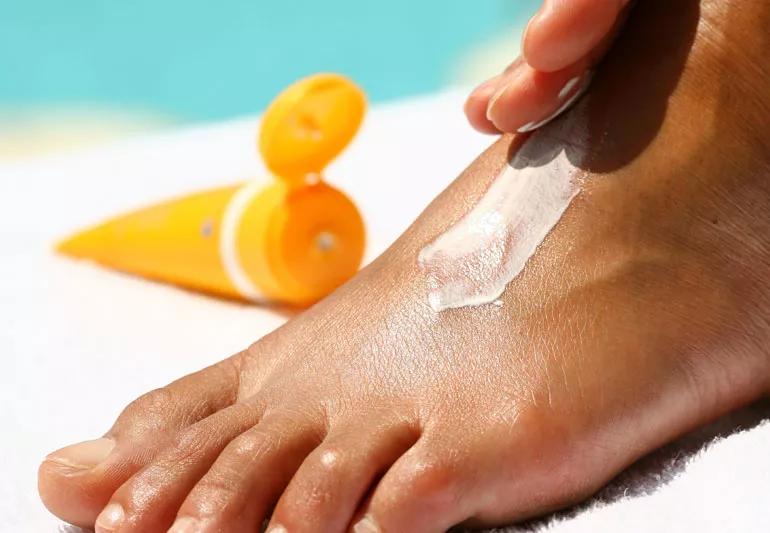It’s easy to forget your ears, eyelids, lips and feet — but any exposed skin needs protection

We all know that we should put on sunscreen every time we are out in the sun. But there are some important parts of the body we often miss.
Advertisement
Cleveland Clinic is a non-profit academic medical center. Advertising on our site helps support our mission. We do not endorse non-Cleveland Clinic products or services. Policy
When is the last time you put sunscreen on your ears? These are among the places that people most often forget to apply sunscreen, says dermatologist Jennifer Lucas, MD.
“Common places people miss are going to be the ears, your eyelids, your lips, your scalp, the top of your feet or places near the edges of clothing, such as straps,” Dr. Lucas says.
The sun’s ultraviolet (UV) rays are the major cause of skin cancer. Healthcare providers believe that people can avoid most skin cancers by taking steps to protect themselves against the cellular damage these rays cause.
Dr. Lucas elaborates on these forgotten spots where we need to apply sunscreen.
You may think you’re being vigilant with your sunscreen protection, but there are five spots on your body that are commonly overlooked:
Ears are the third most common location for skin cancers. Skin cancers can occur on any part of your ear, including the conchal bowl (middle part of your ear), an area that’s relatively protected from the sun.
“Remember that even when you drive in your car, the sun’s rays are hitting your ears through the windows and daily sunscreen use is essential,” Dr. Lucas reminds us.
Sunscreen for eyelids: Yes or no?
Yes! The best way to protect your eyelids is to wear sunglasses. But if you’re trying to avoid tan lines on your face, use an eye cream that contains sun protection factor (SPF), a sunscreen stick and/or one of the mineral sunscreens/sunscreen with physical blockers — titanium dioxide or zinc oxide, Dr. Lucas suggests.
Advertisement
“Most people don’t think about sun exposure on their eyelids, but skin cancers in this area can be particularly challenging to treat,” she adds.
A lip balm that contains SPF will protect your lips. Be sure to reapply frequently if you eat or drink. Skin cancers of the lip most frequently occur in fair-skinned men older than age 50. The lower lip is about 12 times more likely to be affected, owing to its greater exposure to sunlight.
“If you’re out and about or have a tendency to lick your lips, having a lip balm with SPF with you to reapply is a must,” notes Dr. Lucas.
A thick layer of dead skin cells protects the soles of our feet against the sun’s ultraviolet light. But the other side of your feet faces the sun directly when you’re wearing flip-flops and other skin-baring shoes. That makes this area especially vulnerable to the sun’s rays.
“Imagine standing in line at an amusement park or watching a game outdoors and the amount of sun exposure on these areas,” illustrates Dr. Lucas. “Burns are common but preventable.”
Your hair is only so-so protection against the sun’s ultraviolet rays. Your scalp — especially if you’re bald and in the parts of your hair — directly faces the sun, much like the tops of your feet. If you don’t want to wear a hat, be sure to put on some sunscreen.
“It may make your hair greasy and goopy, but you need that layer of coverage actually touching the skin,” says Dr. Lucas. “You may prefer a gel-based sunscreen to cover and protect this area more effectively. The most effective way to protect the scalp is to wear a broad-brimmed hat.”
Sunscreens are very effective when used properly. Follow these guidelines to get the most protection:
Advertisement
Wearing sunscreen is very important for protecting your skin from cancer. And it should be easy to find the right formula for you, whether that’s a spray, gel or lotion (maybe skip the powder sunscreen).
“You’re in control of your skin and can minimize your risk of developing skin cancer and looking older by consistently applying your sunscreen,” encourages Dr. Lucas. “An ounce of prevention is worth a ton of cure.”
Advertisement

Sign up for our Health Essentials emails for expert guidance on nutrition, fitness, sleep, skin care and more.
Learn more about our editorial process.
Advertisement

Several conditions, like vitiligo and fungal infection, can cause a loss of pigmentation, leading to white spots or patches on your skin

This cooling gel can help soothe sunburned skin, but it can’t cure the burn

You know it’s not good if you’ve been holding onto it for more than three years or if it’s changed in color, consistency or smell

Look for a UPF rating of 50+ for optimal protection against UV rays

A sunburn will leave you itchy and red, while sun poisoning can feel like an allergic reaction

A cool shower, aloe vera gel, anti-itch treatments and cool compresses can provide fast sunburn relief

SPF stands for ‘sun protection factor’ — it’s a measure of how much protection you’re getting before a sunburn is possible

This ‘poisoning’ is actually a severe sunburn that seems similar to an allergic reaction

Even small moments of time outdoors can help reduce stress, boost mood and restore a sense of calm

A correct prescription helps your eyes see clearly — but as natural changes occur, you may need stronger or different eyeglasses

Both are medical emergencies, but they are very distinct events with different causes